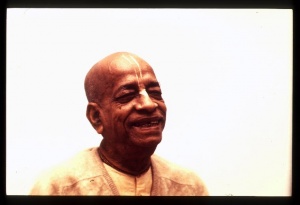SB 6.14.40: Difference between revisions
m (1 revision(s)) |
(Vanibot #0054 edit - transform synonyms into clickable links, which search similar occurrences) |
||
| (One intermediate revision by one other user not shown) | |||
| Line 1: | Line 1: | ||
{{info | {{info | ||
|speaker= | |speaker=sonless queens of King Citraketu lamenting | ||
|listener=King | |listener=sonless queens of King Citraketu | ||
}} | }} | ||
[[Category:Srimad-Bhagavatam - Canto 06 Chapter 14]] | |||
[[Category:Bhagavatam Verses Spoken by the Sonless Queens of King Citraketu lamenting - Vanisource|061440]] | |||
<div style="float:left">'''[[Srimad-Bhagavatam]] - [[SB 6|Sixth Canto]] - [[SB 6.14: King Citraketu's Lamentation|Chapter 14: King Citraketu's Lamentation]]'''</div> | |||
<div style="float:right">[[File:Go-previous.png|link=SB 6.14.39]] '''[[SB 6.14.39]] - [[SB 6.14.41]]''' [[File:Go-next.png|link=SB 6.14.41]]</div> | |||
{{RandomImage}} | |||
==== TEXT 40 ==== | ==== TEXT 40 ==== | ||
<div class="verse"> | |||
<div | :dhig aprajāṁ striyaṁ pāpāṁ | ||
dhig aprajāṁ striyaṁ pāpāṁ | :patyuś cāgṛha-sammatām | ||
patyuś cāgṛha-sammatām | :suprajābhiḥ sapatnībhir | ||
suprajābhiḥ sapatnībhir | :dāsīm iva tiraskṛtām | ||
dāsīm iva tiraskṛtām | |||
</div> | </div> | ||
| Line 17: | Line 22: | ||
==== SYNONYMS ==== | ==== SYNONYMS ==== | ||
<div class="synonyms"> | |||
<div | ''[//vanipedia.org/wiki/Special:VaniSearch?s=dhik&tab=syno_o&ds=1 dhik]'' — all condemnation; ''[//vanipedia.org/wiki/Special:VaniSearch?s=aprajām&tab=syno_o&ds=1 aprajām]'' — without a son; ''[//vanipedia.org/wiki/Special:VaniSearch?s=striyam&tab=syno_o&ds=1 striyam]'' — upon a woman; ''[//vanipedia.org/wiki/Special:VaniSearch?s=pāpām&tab=syno_o&ds=1 pāpām]'' — full of sinful activities; ''[//vanipedia.org/wiki/Special:VaniSearch?s=patyuḥ&tab=syno_o&ds=1 patyuḥ]'' — by the husband; ''[//vanipedia.org/wiki/Special:VaniSearch?s=ca&tab=syno_o&ds=1 ca]'' — also; ''a-[//vanipedia.org/wiki/Special:VaniSearch?s=gṛha&tab=syno_o&ds=1 gṛha]-[//vanipedia.org/wiki/Special:VaniSearch?s=sammatām&tab=syno_o&ds=1 sammatām]'' — who is not honored at home; ''[//vanipedia.org/wiki/Special:VaniSearch?s=su&tab=syno_o&ds=1 su]-[//vanipedia.org/wiki/Special:VaniSearch?s=prajābhiḥ&tab=syno_o&ds=1 prajābhiḥ]'' — who have sons; ''[//vanipedia.org/wiki/Special:VaniSearch?s=sapatnībhiḥ&tab=syno_o&ds=1 sapatnībhiḥ]'' — by co-wives; ''[//vanipedia.org/wiki/Special:VaniSearch?s=dāsīm&tab=syno_o&ds=1 dāsīm]'' — a maidservant; ''[//vanipedia.org/wiki/Special:VaniSearch?s=iva&tab=syno_o&ds=1 iva]'' — exactly like; ''[//vanipedia.org/wiki/Special:VaniSearch?s=tiraskṛtām&tab=syno_o&ds=1 tiraskṛtām]'' — dishonored. | ||
</div> | </div> | ||
| Line 25: | Line 29: | ||
==== TRANSLATION ==== | ==== TRANSLATION ==== | ||
<div class="translation"> | |||
<div | |||
A wife who has no sons is neglected at home by her husband and dishonored by her co-wives exactly like a maidservant. Certainly such a woman is condemned in every respect because of her sinful life. | A wife who has no sons is neglected at home by her husband and dishonored by her co-wives exactly like a maidservant. Certainly such a woman is condemned in every respect because of her sinful life. | ||
</div> | </div> | ||
| Line 33: | Line 36: | ||
==== PURPORT ==== | ==== PURPORT ==== | ||
<div class="purport"> | |||
<div | |||
As stated by Cāṇakya Paṇḍita: | As stated by Cāṇakya Paṇḍita: | ||
:''mātā yasya gṛhe nāsti'' | |||
:''bhāryā cāpriya-vādinī'' | |||
:''araṇyaṁ tena gantavyaṁ'' | |||
:''yathāraṇyaṁ tathā gṛham'' | |||
"A person who has no mother at home and whose wife does not speak sweetly should go to the forest. For such a person, living at home and living in the forest are equal." Similarly, for a woman who has no son, who is not cared for by her husband and whose co-wives neglect her, treating her like a maidservant, to go to the forest is better than to remain at home. | |||
</div> | |||
" | <div style="float:right; clear:both;">[[File:Go-previous.png|link=SB 6.14.39]] '''[[SB 6.14.39]] - [[SB 6.14.41]]''' [[File:Go-next.png|link=SB 6.14.41]]</div> | ||
</div> | __NOTOC__ | ||
__NOTOC__ | __NOEDITSECTION__ | ||
Latest revision as of 22:29, 18 February 2024

A.C. Bhaktivedanta Swami Prabhupada
TEXT 40
- dhig aprajāṁ striyaṁ pāpāṁ
- patyuś cāgṛha-sammatām
- suprajābhiḥ sapatnībhir
- dāsīm iva tiraskṛtām
SYNONYMS
dhik — all condemnation; aprajām — without a son; striyam — upon a woman; pāpām — full of sinful activities; patyuḥ — by the husband; ca — also; a-gṛha-sammatām — who is not honored at home; su-prajābhiḥ — who have sons; sapatnībhiḥ — by co-wives; dāsīm — a maidservant; iva — exactly like; tiraskṛtām — dishonored.
TRANSLATION
A wife who has no sons is neglected at home by her husband and dishonored by her co-wives exactly like a maidservant. Certainly such a woman is condemned in every respect because of her sinful life.
PURPORT
As stated by Cāṇakya Paṇḍita:
- mātā yasya gṛhe nāsti
- bhāryā cāpriya-vādinī
- araṇyaṁ tena gantavyaṁ
- yathāraṇyaṁ tathā gṛham
"A person who has no mother at home and whose wife does not speak sweetly should go to the forest. For such a person, living at home and living in the forest are equal." Similarly, for a woman who has no son, who is not cared for by her husband and whose co-wives neglect her, treating her like a maidservant, to go to the forest is better than to remain at home.